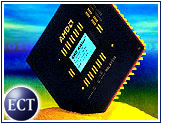
Recent high-end performance tests show AMD’s 64-bit Athlon and dual Opteron processors beating Apple’s G5 and Intel’s Pentium 4, but analysts have downplayed the results, citing a lack of available 64-bit applications and the timing of the benchmarking results.
While Apple has claimed its Power Mac G5 is the world’s fastest personal computer, the G5’s processor failed to top the Athlon64 in speed tests running Word and Premiere 6, according to PC World tests. In addition, the G5, like Intel’s Pentium 4, provided fewer frames per second on Quake III than the Athlon and also lost to AMD’s Opteron in tests involving Photoshop 7.0.1.
Still, analysts agreed it is too soon to gauge the performance of 64-bit processors because there aren’t enough 64-bit applications on the market to determine which processor is fastest in multiple benchmarks. Analysts also indicated the true performance value of the different high-end processors depends on the specific application.
“Tune in a year from now, and then we’ll have a better idea of how these chips run on real-world, 64-bit applications,” Aberdeen Group chief research officer Peter Kastner told TechNewsWorld.
Bragging and Timing
While some users already have begun to brag on Internet message boards about Athlon’s success in the tests, analysts agree that benchmarking depends to a large extent on market timing. Apple’s claim of “world’s fastest” computer might have been accurate when the company shipped the G5 two months ago.
“Apple’s processor has been shipping for a few months,” Gartner vice president Martin Reynolds told TechNewsWorld. “The Athlon64 and Opteron are only just hitting desktops.”
Reynolds, who credited memory bandwidth rather than raw processing speed for Opteron’s Photoshop win, looks beyond processor performance. “Apple occasionally makes the ‘world’s fastest’ claim, but doesn’t keep at it for long. Apple’s value is well beyond pure processor speed.”
Competing or Common?
IDC senior analyst Shane Rau told TechNewsWorld that there may appear to be competition between Apple and AMD because the companies have the first two 64-bit processors for the desktop market. But the companies are sending a common message that their 64-bit solutions are intended for specific sets of users, he said.
Apple market for the high-end G5 is the company’s faithful content-creation users, who typically work in computing-intensive environments, such as video editing or graphics production. For AMD, the target market for high-end processors is gamers, although there is still no pure 64-bit Athlon system, according to Rau.
Kastner said Apple developers are sure to develop programs quickly to take advantage of 64-bit computing. But for Athlon64, the market is still unknown because Microsoft’s 64-bit version of Windows XP has yet to arrive.
The 64-Bit Question
Kastner, who pointed out that the PC World tests did not use 64-bit software, said neither Apple nor AMD users are truly taking advantage of 64-bit computing at this point, largely because of the lack of applications optimized for the technology.
“That means users really aren’t getting any benefit out of 64-bit instructions on Athlon or Apple,” said Kastner. He indicated Apple’s G5 might in fact have been the fastest PC on the day it was made available and that AMD’s Athlon is “a very competitive chip priced at a heady level for AMD.”
Reynolds agreed that 64-bit computing is irrelevant right now and added that the recent tests could have resulted in slower benchmarks than could be achieved using native 32-bit technology. “These processors are fast even in 32-bit mode, as they represent the latest and greatest,” he said. “But 64-bit benchmarks may even show slower results, as 64-bit addressing creates more work.”





















































